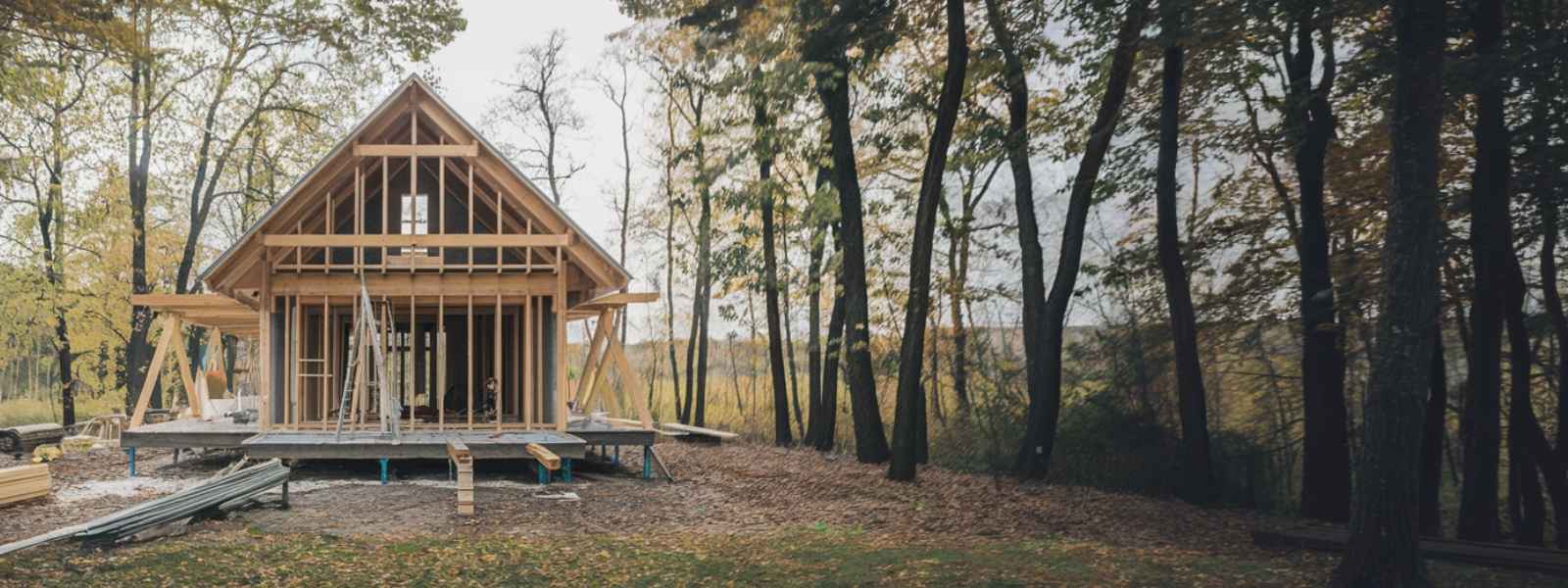
Building Loans: Build It Right, Finance It Smart
Take the first step toward your new home with a building loan—get started now!
Arcadia Finance helps you in the search of loans from different banks and lenders. Fill in a free application and get loan offers from up to 16 lenders. We work with well-known, trusted, and NCR-licensed lenders in South Africa.
Are you looking to create your ideal home from the ground up or undertake a substantial renovation? A building loan can provide the necessary financial support to bring your vision to life while potentially enhancing the value of your property. However, it’s essential to approach this with a thorough understanding and preparation.
What is a Building Loan?
A building loan is a financing option specifically designed for constructing a new home on an empty plot or for funding significant additions or renovations to an existing property. This type of loan is essential for covering the costs associated with each stage of the construction process and can also support projects that enhance or expand your home.
When planning to construct a new home, securing a building loan is crucial to manage the various expenses involved. This loan is also advantageous for large-scale renovations, such as expanding a kitchen or adding an extra bedroom or workspace. For investors purchasing properties with the intention of renovating and selling them for a profit, a building loan can facilitate quicker completion of improvements, allowing you to bring your investment to market sooner.
How is a Building Loan Different from a Home Loan?
While the application process for a building loan is similar to that of a home loan, the primary distinction lies in the disbursement of funds. Rather than receiving the entire loan amount upfront, the bank releases the funds incrementally. Each time a significant phase of construction is completed, a portion of the loan is disbursed. This method ensures that funding is aligned with the project’s progress, providing a structured approach to financing construction or renovation projects.
About Arcadia Finance
Secure your loan effortlessly with Arcadia Finance—no application fees and a choice of 16 reputable lenders, all compliant with South Africa’s National Credit Regulator. Enjoy a streamlined, trustworthy process tailored to your financial needs.
How to Determine If You Qualify for a Building Loan
To qualify for a building loan, you must meet several specific requirements. Here’s a breakdown of what’s needed:
- Minimum Age Requirement: Applicants must be at least 18 years old.
- Credit Record: A good credit history is essential. You can verify your credit score using ooba Home Loans’ free online tool, the Bond Indicator. Generally, a credit score above 670 is considered favourable.
- Purpose of Finance: The funds provided by the building loan must be strictly used for constructing or modifying a residential property.
- Contractor Registration: For new building projects, it is mandatory that the contractor is registered with the NHBRC (National Home Builders Registration Council).
- Deposit Requirement: Usually, you will need to provide a deposit, typically 10% of the project’s cost. Alternatively, you may apply for a 100% bond, which eliminates the need for an upfront deposit. However, be aware that this option will lead to higher monthly payments.

Documents Required for a Building Loan
Use this checklist to ensure you have gathered everything needed for a successful building loan application. Once these documents are ready, submitting your application becomes straightforward. With your paperwork in order, your building project is set to proceed smoothly from start to completion.
- Salary Slips: Provide three to six months’ worth of salary slips, depending on your employment type. These are essential to calculate your monthly income and demonstrate your financial standing.
- Bank Statements: Submit statements from the past three months to verify your income and confirm your monthly expenses. This ensures lenders have a clear view of your financial stability.
- Building Plans: Include your building plans and detailed specifications of the project. While formal approval of the plans isn’t necessary at this stage, lenders need a clear outline of the proposed structure and an indication of the final appearance.
- Schedule of Finishes: Prepare a list detailing the materials intended for use in each room and area, covering everything from flooring to finishes. This helps to establish the quality and scope of the materials involved.
- NHBRC Certificate: Ensure your builder is registered with the National Home Builders Registration Council (NHBRC). The NHBRC certificate confirms that your builder is qualified to undertake your specific type of property project.
- Building Contract: This document is the agreement between you and your builder. It outlines the scope of work, timelines, and terms, providing a clear framework for the project.
- Building Quote: Submit a quote from your builder, detailing cost estimates for the entire scope of work. This provides the lender with a transparent view of expected expenses.
- Waiver of Builder’s Lien: Include a signed waiver of builder’s lien, an agreement where the builder relinquishes the right to retain possession of the property in the event of a dispute over payment. This protects your ownership rights throughout the building process.
Benefits of Building Loans
Building loans offer distinct advantages for homeowners looking to create or enhance a space tailored to their specific needs. Unlike traditional home loans for purchasing existing properties, building loans support full customisation, enabling you to design your home from the ground up, including layout and finishes. This flexibility not only enhances property value by aligning with market demands but also provides cost control through staged fund disbursements that match each phase of construction, effectively managing expenses.
With a building loan, you can oversee each construction stage, making adjustments as the project progresses and ensuring quality through inspections. Additionally, this financing allows you to select high-quality materials and trusted builders, ensuring that safety and durability standards are upheld. Building loans are also an excellent option for major renovations, enabling you to add space, upgrade features, or implement structural changes that enhance both liveability and market appeal.

Alternative Financing Options for Home Construction
For those who may not qualify for a building loan or need supplementary funding, there are several alternative financing options to consider. Each option comes with its own set of benefits and potential limitations, making it essential for borrowers to evaluate which best fits their financial situation and project needs. Here’s a look at some popular alternatives:
| Financing Option | Description | Advantages | Considerations |
|---|---|---|---|
| Home Equity Loan | Borrow against the equity in your existing property, providing a lump sum for construction or renovation. | – Lower interest rates compared to unsecured loans – Fixed repayment terms for easier budgeting – Suitable for substantial renovations | – Requires significant home equity – Risk of foreclosure if unable to repay |
| Home Equity Line of Credit (HELOC) | Functions like a credit card with a set limit based on home equity; draw funds as needed and pay interest only on what is used. | – Flexibility to draw funds as needed – Interest paid only on the amount used – Useful for projects with unpredictable costs | – Variable interest rates may fluctuate – Similar foreclosure risk as home equity loan |
| Personal Loan | Unsecured loan with no collateral required, suitable for smaller construction projects or renovations. | – No collateral required, more accessible – Fast approval process – Fixed interest rates for predictable payments | – Higher interest rates than secured options – Typically shorter terms leading to higher monthly payments – May not suit large projects |
| Construction Bond | Issued by a lender to guarantee project completion, with funds released as phases are completed. | – Provides security to homeowner and lender – Ensures project completion as per contract – Can complement other financing | – Additional cost, such as bond premiums – Not a direct source of funds, but a project guarantee |
| Cash-Out Refinance | Refinance your mortgage and withdraw a portion of your home’s equity as cash for construction or renovation. | – Access substantial funds at lower rates – Fixed terms for stability – Suitable for large projects | – Extends mortgage term, potentially increasing total interest – Requires significant home equity |

Comparing Building Loans from South African Banks
When considering a building loan, South African banks offer various options, each with unique terms, rates, and requirements tailored to meet the needs of individuals building or renovating a property. Below is an overview of building loan offerings from some of the major South African banks to help you identify the features and benefits that may suit your project best.
| Bank | Loan Structure | Interest Rates | Requirements | Notable Features |
|---|---|---|---|---|
| Absa | Offers a building loan with funds released in stages as construction progresses, based on milestone completion. | Rates vary according to the client’s credit profile and risk assessment. | Minimum deposit may be required NHBRC-certified builder Detailed building plans | Clients can apply for 100% of the building cost, depending on creditworthiness. Allows flexible payments |
| Standard Bank | Building loans with staged payments at significant construction milestones, tailored to self-build and renovation projects. | Customised rates based on risk and credit assessment. | Deposit often required, depending on project NHBRC-certified contractor Project plans | Flexi Option allows clients to access prepaid funds. Up to 100% financing may be available |
| Nedbank | Offers building loans with incremental disbursement based on certified progress of construction. | Competitive rates linked to prime; tailored based on applicant’s profile | Deposit may be required NHBRC certification for builders Detailed project documentation | Up to 100% bond possible depending on client’s profile. Linked HomeVision account offers flexibility |
| FNB | Building loans disbursed in stages based on project milestones, for both new builds and large renovations. | Linked to prime interest rate, adjusted per client profile. | Deposit required for some clients Builder must be NHBRC-registered Detailed building plans | “Smart Bond” option allows access to additional funds during the building phase. |
| Investec | Tailored building loans primarily for high-net-worth individuals, with funds released according to project milestones. | Rates typically linked to prime, customised for high-net-worth clients. | Strong credit profile High-value projects NHBRC-certified contractor | Highly customised loan structures for luxury or complex projects. Dedicated private banking service |
Conclusion
Building loans provide a valuable financing solution for individuals looking to create a custom home or undertake significant renovations. With incremental disbursements aligned to construction progress, these loans offer flexibility and cost control, enabling homeowners to oversee each phase of their project. While qualification requires a sound credit history, project documentation, and a registered contractor, alternative financing options, such as home equity loans and personal loans, are available for those who may need additional funding or who do not meet standard building loan criteria. By carefully considering the requirements and options, borrowers can make informed decisions to confidently achieve their home-building goals.
Frequently Asked Questions
The primary difference lies in how funds are disbursed. With a building loan, funds are released in stages, aligned with the completion of each construction phase. This incremental release of funds helps ensure the project stays on track financially, whereas a regular home loan provides a single lump-sum payment for the purchase of an existing property.
Yes, in most cases, a deposit is required—typically around 10% of the project cost. Some lenders may offer 100% financing for borrowers with strong credit profiles, but this option often results in higher monthly payments. It’s best to check with your lender regarding specific deposit requirements based on your financial profile.
Yes, building loans can be used for large-scale home renovations, including adding rooms, expanding spaces, or making substantial structural changes. As long as the renovation project aims to improve or expand your property, a building loan can be an excellent way to finance it.
Typically, you will need salary slips, bank statements, detailed building plans, and a schedule of finishes. Additionally, your builder must be registered with the National Home Builders Registration Council (NHBRC), and a building contract and quote are necessary to outline the project scope, costs, and timelines.
Yes, alternatives include home equity loans, home equity lines of credit (HELOC), personal loans, and cash-out refinancing. Each of these options has its own benefits and requirements, so it’s essential to evaluate which best fits your financial situation and project size if a building loan is not accessible.



